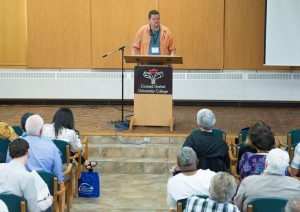BOGOTÁ, Colombia
Conrad Grebel University College hosted academics, practitioners, artists and church workers at the inaugural Global Mennonite Peacebuilding Conference and Festival, June 9–12, 2016. In Waterloo, Ont., 203 people from 20 countries (from Canada to Colombia to DR Congo) attended 30 concurrent sessions.

MWC Peace Commission Secretary Andrew Suderman leads a workshop exploring the idea of a Global Anabaptist Peace Network at the Global Mennonite Peacebuilding Conference. Photo courtesy of the Global Mennonite Peacebuilding Conference (Jennifer Konkle).
Three plenary speakers (including Fernando Enns of Germany and Paulus Widjaja of Indonesia, known for their service with Mennonite World Conference), two banquet speakers, seven storytellers and six listeners led the event. In addition to lectures, the conference included seven installations of art, photography and sound, one concert, one play, three worship sessions and two drum circles.
The conference examined a diversity of peace-related topics, such as inclusion and exclusion in the Mennonite church, development and livelihoods, history and theology, reflective practise, and case studies from India to Indonesia and from Laos to South Africa.
The MWC Peace Commission led a workshop to explore the idea of a Global Anabaptist Peace Network (GAPN). Jenny Neme and Robert J. Suderman (both of the Peace Commission) and Noe Gonzalia (member of the GAPN Advisory Committee) shared stories to highlight the importance and blessings of being interconnected and the support and solidarity that comes with it.
“There was a good spirit of engagement and interest in the idea of a Global Anabaptist Peace Network and the proposal presented. Most of the discussion that followed the presentation of the GAPN proposal focused on the organizational structure of the network,” says Peace Commission secretary Andrew Suderman who led the workshop and ensuing discussion. “It is exciting to see how this has already inspired some to think of the ways in which we are already and can further support one another as this network begins to take shape.”
The event included creative evening events: Thursday’s public concert “Voices for Peace” and Saturday’s premiere of Theatre of the Beat’s “Yellow Bellies: An Alternative History of WWII,” and closed with a Sunday morning worship service and final plenary.
Funding for the event came from 23 sponsors and financial supporters, including the Social Sciences and Humanities Research Council of Canada and the Mennonite Savings and Credit Union.
—Mennonite World Conference release